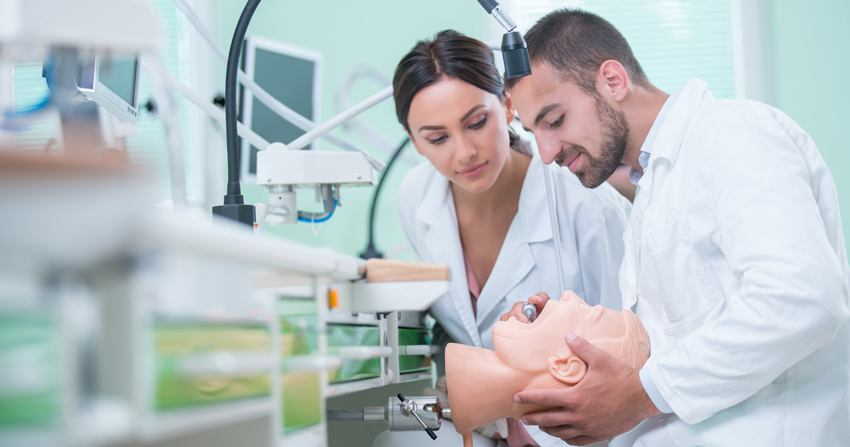Figuring Out How Long Does It Take to Become a Dentist
Completing a Bachelor’s Degree before Dental School
The majority of dental schools require students to complete a bachelor’s degree prior to attending. In general, students take anywhere from three to six years to complete a “four-year” degree. However, research by the U.S. Department of Education shows that the type of college you attend actually affects the median completion time.
The median time 2008 graduates of a public four-year institution took to finish their degree was 55 months. For non-profit private school graduates, it was nearly a year less at 45 months. Graduates of private for-profit institutions took a whopping 103 months—around 8.5 years.
Whether or not you have transferred schools also plays a factor. The median length of time to graduate for students attending one four-year institution is 45 months. Students who transfer from one four-year institution to another take 11 months longer. Those who transfer two or more times take 83 months. Students who start out in community college and then transfer take a little longer than those who only attend a four-year college. These students take a median time of 63 months to earn their degree.
Studying for and Passing the Dental Admissions Test (DAT)
When considering how long it takes to be a dentist, do not forget about the time it takes to apply for schools. Applying for dental school requires the successful completion of the Dental Admissions Test. Think of it like the SAT or ACT for dental school. It is four consecutive multiple-choice tests: Survey of Natural Sciences, Perceptual Ability, Reading Comprehension, and Quantitative Reasoning. You have 4 hours and 15 minutes to take the test, which is administered at approved testing centers. Most students take the DAT after their third year of college.
Getting a good score on the DAT is essential for dental school admission. You will find many study resources online to help with your preparation. The American Dental Association offers a lot of test prep including a full practice test on its website. The amount of time that students study for this exam greatly varies. Some study plans recommend studying 40 hours per week for around eight weeks. Other plans suggest studying for 3-6 hours per day for around five months.
The test is scored on a scale of 1 to 30 with the average score being 17. You can retake the exam a maximum of three times, but you must wait 90 days between attempts. To get an idea of how well you need to do, check out this table of the average DAT score held by students at each dental school.
How Long Does it Take to Earn Your DDS or DDM Degree?
Dental schools offer two different professional degrees: the Doctor of Dental Surgery (DDS) and the Doctor of Dental Medicine (DDM). The curriculum is a combination of classes and clinical rotation hours. Both programs prepare you for licensure and take the same amount of time to complete. Full-time students can expect to finish their degree within four years.
Earning a Dual Degree Takes Longer
Many schools allow dental students to pursue their DDS or DMD along with another degree. Students wishing to earn a dual degree will spend additional time in school. Popular choices are an MBA, a Master of Public Health, or a Master of Science in a related discipline. Some universities even offer a way to earn your Ph.D. Those adding a master’s degree might spend an extra year while a Ph.D. can take an extra three or four years. Don’t forget that the master’s degree won’t be cheap either!
Combination Programs for Dentistry Save You Time
Although not very common, some dental schools accept students right out of high school. Students walk away with a bachelor’s degree and a doctorate in fewer than eight years. For example, the Herman Ostrow School of Dentistry of USC accepts students into a six-year dental program. They earn a bachelor’s degree in Dental Hygiene while they work toward earning their DDS degree. Boston University’s Henry M. Goldman School of Dental Medicine offers a similar seven-year program. Combination programs save you both time and money. However, they are extremely competitive and selective.
Pursuing a Specialty Takes Additional Time
Dentistry includes nine recognized specialties that all require additional training after becoming licensed. These include dental public health, endodontics, oral and maxillofacial pathology, oral and maxillofacial radiology, oral and maxillofacial surgery, orthodontics and dentofacial orthopedics, pediatric dentistry, prosthodontics, and periodontics. The time to complete each specialty is as follows:
- Dental Public Health: Competitive residency program lasting an average of 14 months
- Endodontics: Two-year residency program and an independent research project
- Oral and Maxillofacial Pathology: Four-year residency program; six years for a medical degree
- Oral and Maxillofacial Radiology: Two-year in-hospital residency program; two to five years for M.S. or Ph.D.
- Oral and Maxillofacial Surgery: Four-year residency program; six years for an MD degree
- Orthodontics and Dentofacial Orthopedics: Two to three years in a graduate program
- Pediatric Dentistry: Two-year residency program
- Prosthodontics: Three-year residency training program
- Periodontics: Competitive residency program lasting 30 to 36 months
Dentists can also choose to become a teacher or researcher—also known as an academic dentist. This too takes additional time. Aspiring researchers and teachers will spend an added two to five years in residency. Dual degree programs, as mentioned above, let you earn your doctorate quicker, saving you both time and money.
How Long Does It Take To Become a Dentist?
Becoming a dentist will typically take 8 years but can vary based on specialty. Once you finish your 4-year bachelor program, you would have another 4 years in dental school. If you choose any additional specialties the time it takes to could increase.


